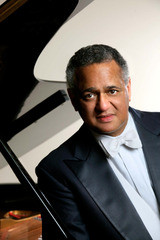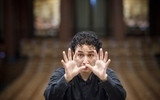|
Back
An Epic Introduction Houston
Jones Hall
09/19/2014 - and September 20, 21, 2014
Gabriela Lena Frank: Karnavalingo
Sergei Rachmaninoff: Piano Concerto No. 2 in C Minor, Op. 18
Richard Strauss: Ein Heldenleben, Op. 40
André Watts (piano)
Houston Symphony, Andrés Orozco-Estrada (conductor)
Andrés Orozco-Estrada has officially arrived, and his first subscription concert at the Houston Symphony’s fifteenth music director was an unqualified success. Injecting the traditional overture-concerto-symphony format with a world première and energetic perspectives on repertoire staples, the charisma emanating from the podium made one want to come back to Jones Hall again and again to see the potential of this powerful partnership develop.

G. L. Frank (© Sabina Frank)
The evening began with an engaging conversation between Gabriela Lena Frank and Orozco-Estrada. Ms. Frank charmed with descriptions of her new work’s influences, citing her Peruvian heritage and singing rhythms from coastal South American dances. While her introduction was delightfully upbeat, Karnavalingo itself was surprisingly dark and brooding. There were plentiful colors and rhythms, as expected, but the piece was caught in a state of perpetual introduction. It never became clear what was primary and what was subsidiary. None of the many attractive ideas ever took root and developed into a true, rhythmic dance in the way they would in works by other “musical anthropologists” (and self-professed influences on Ms. Frank) such as Bartók and Ginastera. This isn’t to say that we wanted a simple imitation of, for example, the “Danza final” from Estancia, but the overall structure came across as overly episodic and excessively ornate. Orozco-Estrada intimated that all future seasons would open with new music, and one hopes that this promise holds. It will be a pleasure to hear more from Ms. Frank in her three-year tenure as the orchestra’s composer-in-residence.

A. Watts (© Steve J. Sherman )
André Watts’ pianism is always something to look forward to, and he brought musical authority to his performance of Rachmaninoff’s masterful Second Concerto. The opening chords emerged from an ethereal distance, and the main melody in the strings was delivered with a notably richer, darker tone than we’ve heard from the orchestra in a while. If the opening movement contained a few shake-ups on the keyboard, Mr. Watts’ account of the second movement was spot-on, and by the finale his technical command was flawless. Orozco-Estrada was an excellent accompanist, perfectly matching Watts’ subtle but constant rubato. There is a bevy of new associate principals in the orchestra, and they are excellent additions: flutist Matthew Roitstein and hornist Robert Johnson were especially fine in their solo passages.

A. Orozco-Estrada (© Werner Kmetitsch)
After intermission, Orozco-Estrada continued to impress from the podium in a sweeping, bold and assertive reading of Ein Heldenleben. This mammoth musical autobiography is, like Karnavalingo, abundant with ideas, but Strauss has plenty of time to examine and develop them all and focuses on the hero’s main motive, leaving little doubt as to what is important in the work’s motivic hierarchy.
The Houston Symphony has always impressed in this piece, but Orozco-Estrada seemed to add extra energy and propulsion to the performance. Heroic unison horn lines, bellicose off- and onstage trumpet affronts, and judgmental tuba parallels were excellent throughout. The woodwinds cackled their adversarial counterpoint with razor-like precision, while the strings offered dazzling agility and sweep. Individual solos also impressed, especially Frank Huang’s impeccable portrayal of the hero’s companion and William VerMeulen’s velveteen solo horn contributions in the work’s closing minutes.
Marcus Karl Maroney
|